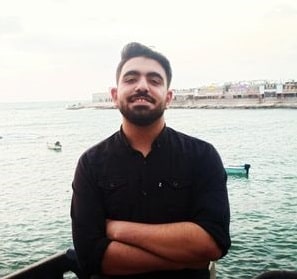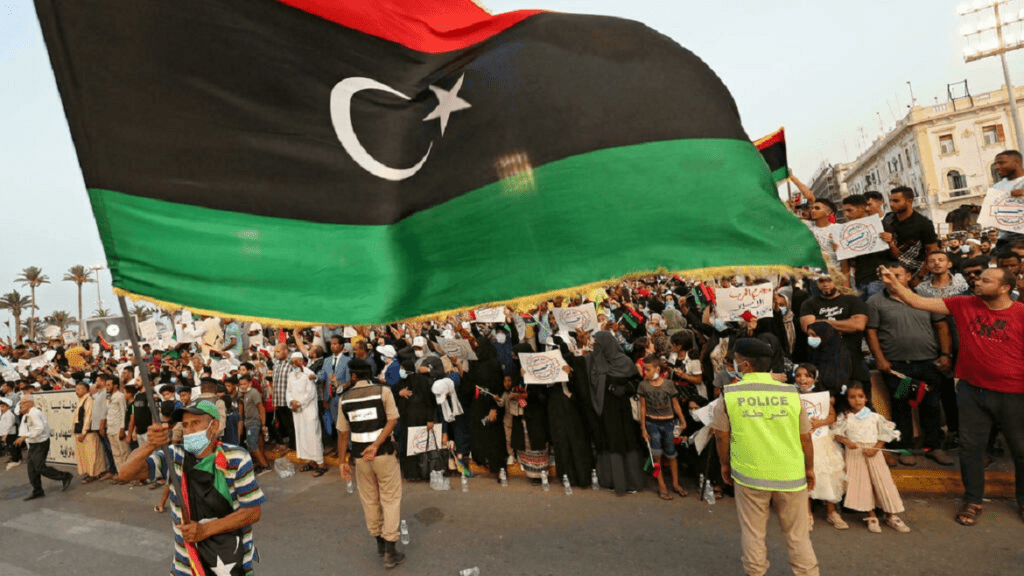By Eslam Abdelmagid Eid
Libyans are looking forward to their upcoming presidential elections, in light of high international and regional expectations for the results of the electoral process.

Some candidates are expected to receive support from various external forces, in elections that the Libyan House of Representatives has announced will be held on December 24. Some doubts remain about the ability of Libyan parties to hold elections on schedule, especially in a country like Libya, which has been living in chaos and conflicting parties in the east and west of the country since the fall of the Gaddafi regime in 2011.
Libya’s presidency is at the center of everyone’s attention
Since the opening of the doors for nominations for the Libyan presidential elections, there has been a clear desire among Libyans to participate in this historic event, and this was reflected in the large number of candidates announced by Libya’s High Electoral Commission, which amounted to 98 candidates. Many did not expect this strong turnout.
But on the twenty-fourth of this month, the commission announced the exclusion of 25 candidates, bringing the number of current candidates to 73, and the commission is expected to publish the final list of candidates early next month, as had been announced earlier.
Topping the list of candidates are Libyan army commander Field Marshal Khalifa Haftar, the head of Libya’s current government, Abdel Hamid al-Dabaiba, and the President of the Parliament, Aqila Saleh, at a time when the commission announced the exclusion of Saif al-Islam, son of the former Lybian leader Gaddafi, who was expected to gain a lot of support. His exclusion came because of his violation of two articles of the law on the election of the head of state, with the committee indicating that “Article 10, clause 7, and Article 17, clause 5 do not apply.”
Where will the Libyans stand?
The competition for the presidency is expected to be limited, according to recent developments, between the trio of Dabaiba, Haftar and Aqila Saleh, and then to a lesser extent the former interior minister of the government of national accord, Fathi Bashagha, who is expected to garner many votes in the Libyan west, particularly in his hometown of Misurata, whiere he controls some armed militias. Bashagha is seen as the person who can take on the power centers in the country by his supporters because of his previous experience as interior minister, which may lead to the fragmentation of votes between him and Dabaiba in the west, especially since Dabaiba is another from the city of Misurata.
While Dabaiba has recently enjoyed a lot of support, especially in the Libyan west, particularly in the Tripoli region, he also has popularity in some southern cities, and this is also due to the relative stability and cessation of armed operations that followed his assumption of the presidency of the government, and he has also taken advantage of his presence in the position to mobilize the masses through projects that Libyans have benefited from, as he focused during his last term in office on providing grants and loans to young people and allocating apartments for them, as well as providing job opportunities for the unemployed. Dabaiba overcame the obstacle that was facing his candidacy, which is Article 12 of the electoral law, which states “The candidate must be a candidate. For such a position, it is necessary to resign with a retroactive date of not less than three months, in case he occupies a sovereign position of the state.”
Field Marshal Haftar will mainly have the support of the eastern region and some areas in the south for political reasons. Some believe that Haftar is the only way to stop the influence of armed groups in the West, also considering the anger of many Libyans against the Brotherhood and its ally Turkey. An alliance between Haftar and Aqila Saleh is expected, at the very least, for one of them to reach the second phase of the elections. What may increase Haftar’s chances is that Egypt may convince Fathi Pashaga in the west and Haftar in the east to form an alliance between the two parties, especially since Pashaga is considered close in the last period to Cairo and visited it recently earlier this month This could greatly increase Haftar’s chances in the next elections, but this possibility remains somewhat remote, especially since the Bashagha militias in Misurata belong to the anti-Haftar Islamist movement. However, even if Haftar loses the elections, he will be the most profitable loser because he will return to his position as army commander, and therefore it is possible that Haftar will not react violently if he loses the elections and accept his previous position as army chief, thus avoiding potential international pressure.
On the other hand, the President of the Libyan parliament, Aqila Saleh, recently filed his candidacy papers, despite numerous speculations of pressure imposed on him not to run, so it is expected that voices in the eastern region will witness a state of fragmentation between Haftar and Aqila Saleh, but Aqila Saleh may be acceptable to popular circles in the West, and in the southern province of Fezzan that might be missed by Field Marshal Haftar.
The position of international and regional powers vis-à-vis the candidates
First: The Egypt-Emirati Axis
Certainly, Egypt and the United Arab Emirates are siding with Field Marshal Haftar in the upcoming elections for political and security reasons, particularly for Egypt’s fear of the increased influence of the Muslim Brotherhood and other armed groups in Libya, which may pose a threat to Egyptian national security. Field Marshal Haftar’s presence in eastern Libya helped counter the influence of armed militias. Haftar has been in permanent security contact with the Egyptian leadership to coordinate the war on terrorism in Libya. The Egyptian and Emirati leaderships fear that the situation will change after the Libyan presidential elections, especially if Field Marshal Haftar loses the elections and Dabaiba wins. Egypt could also support Fathi Pashaga, who visited Cairo recently, trying to gain Cairo’s confidence in the upcoming elections, and to get Egypt’s help in removing mercenaries from Libya. Given the Libyan West’s military leaders loyal to Turkey, led by Imad Trabelsi and Osama al-Juwaili, Egypt could see in Bashagha a statesman who can also deal with the militias despite the previous dispute. The possibility of supporting him in the elections therefore remains.
Second: Turkey
Turkey is one of Abdel Hamid Dabaiba’s most important supporters, and there is no doubt that it will provide all available means of support for him to ensure his success in the upcoming elections, especially after Dabaiba recently expressed during his visit to Ankara earlier this month his desire to increase the number of Turkish military advisors in Libya. There is an agreement between Erdogan and Dabaiba also to activate the agreement of understanding in the field of defining areas of maritime jurisdiction signed two years ago with former Prime Minister Fayez Al-Sarraj. This means that Ankara will continue to support Dabaiba to achieve its interests, especially taking into account the successes on the ground that the Government of National Accord previously achieved against Haftar, preventing him from entering Tripoli thanks to Turkish military and material support. Turkey will not easily abandon its presence in Libya, and perhaps Dabaiba’s previous success and his election as prime minister on February 5 is the best proof of that. With no previous political experience prior to his premiership, there are some reports indicating that Turkey has already used many means to tamper with the elections, and thus Turkey will most likely provide material, logistical, and media support to Dabaiba. It is expected that Turkey will use its militias for him in the electoral battle, which may raise fears of a possible manipulation of the electoral process or its disruption Also it is expected that Dabaiba will have the support of Khaled Al-Mashri, head of the Supreme Council of State, and his Brotherhood faction loyal to Turkey.
Third: France and Italy
Since the beginning of the crisis in Libya in 2011, the Franco-Italian dispute has emerged over the course of the political process in Libya and what situations will serve their conflicting interests. Italy has historical ties to Libya and is also its gateway to Africa. Italy imports around 48% of its oil needs from Libya. Therefore, oil takes on a leading role. This is why Italy has supported the Al-Wefaq government to protect its oil interests in western Libya, especially in Misurata, and has even coordinated with armed militias to prevent the passage of migrants to its lands.
While France fears the expansion of the influence of armed groups in Libya to their areas of influence in Africa, especially in the Sahel and Sahara regions, and believes that the control of terrorism in Africa starts in Libya, so it has always provided support to the Libyan National Army in the east of the country.
But it seems that the recent Paris conference may create a state of relative consensus between the two sides. The two sides have agreed on the need to hold elections on time and for the mercenaries to leave the country. It seems that Italy has also begun to feel the danger of the Turkish incursion into Libya and the need to unify the European position.
It is expected that France will support the presence of Aguila Saleh as a consensus candidate instead of Haftar, whose victory in the elections could create a state of division in the country. At the same time, Aqila Saleh has a close association with the national army, which France believes will ensure the country’s protection from terrorist groups.
In conclusion, there is great attention, and international pressure, towards the Libyan presidential elections aimed at ensuring that they take place on schedule, this especially on the American side, which stressed this in the words of its foreign minister, “Anthony Blinken”, and on the part of the European Union adopted a legal framework that allows the imposition of sanctions on those who obstruct elections in Libya, in accordance with UN Security Council Resolution 2571. However, doubts remain about the credibility of the international promises, in light of internal divisions and threats by armed groups to undermine the elections, as the leader of the Libyan Brotherhood “Khaled Al-Mashri”, who heads the so-called Supreme Council of State, has recently called for a siege of state institutions and prevented candidates, in particular Field Marshal Haftar, from running in the upcoming elections. And the situation could get worse if Haftar wins the elections, as this could lead to a major chaos led by Western armed militias and the Brotherhood loyal to Turkey.
Author: Eslam Abdelmagid Eid (Academic, political researcher, and specialist in Middle East affairs)
(The views expressed in this article belong only to the author and do not necessarily reflect the editorial policy or views of World Geostrategic Insights).







